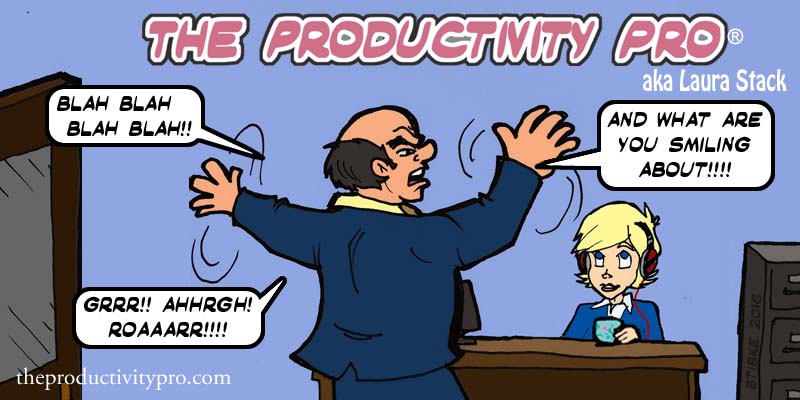“The time to relax is when you don’t have time for it.”–Sydney J. Harris, American journalist.

Despite the many arguments to the contrary, stress isn’t necessarily bad for you. A little stress forces you to get off your duff and try to improve your life. Every good thing that humans have accomplished—from starting fires, to figuring out how to break rocks to make stone tools, to traveling to the moon—has been triggered by a form of stress, whether environmental, physical, or mental. Psychologist call positive stress eustress. What really hurts us is strain: too much stress forced on us too quickly for too long, without let-up. That’s what causes people to break.
This does not mean, however, you should invite stress when you can avoid it, or take on more stress just for your own good. Most of us already have enough stress in our lives. If you can dial stress down, then you can focus more of your energy on efficiently and effectively doing your work,() striving for peak performance without having to divert some of your energy to mere survival.
Let’s take a look at five things you can do at work to decrease stress.
1. Run away! A “running” joke in the cult classic film Monty Python and the Holy Grail is Brave Sir Robin’s method of dealing with danger: “Run away!” In all seriousness, this isn’t a bad idea for stress. When a stressful situation rears its ugly head, step out of the room and avoid it if you can, especially if it doesn’t directly impact you. Go back to your workspace, put on your noise-reduction earphones, and dive into your work.
2. Singletask. Multitasking doesn’t work well for most of us, though it might be workable for the post-Millennial generation as they adapt to constant noise and distraction. I often recommend singletasking, because it really works. It’s amazing how much you can forget about something when focused on something else. When you can focus like a laser on one thing either until it’s over or you’ve put it away for the day, you’ll inevitably benefit. Even when you’re overwhelmed, single-task. Worrying about all you have to do won’t help you, it’ll just paralyze you—and if you keep doing one thing at a time, you’ll eventually get out from under anyway.
3. Take a walk. If you feel stress overwhelming you, take a break. Leave the building and walk around the courtyard or the block. If you work in a large building, you can stay inside and simply walk around the building, or up or down the stairs. Or get in your car and go run some errands. This may not be an option for everyone, but most of us aren’t chained to our desks, and it’s healthy to get in some physical activity while trying to temper the stress in your mind.
4. Face and overcome your stressor. Sometimes, the best way out is through. Face your stress head on and try to work it out, especially if it’s a person you work with regularly. Express your perspective and make a direct request for what you want. Most people never discuss the issue bothering them directly with the perpetrators. Though it’s not always a fun conversation, you’ll feel a vast sense of relief and pleasure at having dealt with the issue. If not, you’re probably no worse off than before.
5. Prepare a soothing drink and breathe. While I doubt your office has a fully stocked bar, it’s likely to have a place where you can prepare a nice cup of coffee or herbal tea to help you keep your cool. It’s up to you to decide whether to have it hot or iced, but if the weather is contributing to your mood, then cool down your drink on hot days, and warm it up for autumn and winter. A few moments away purposefully preparing and sipping your drink will give you distance from your stressor. Close your eyes and take a long, deep breath for five seconds, hold, then exhale for an equal amount of time. Do this for a few minutes, holding off additional thoughts, and you’ll likely feel better.
Mellowing Out
As we’re bombarded with constant annoyances and distractions in the modern, open-plan office, it’s easy to lose track of what really matters and allow stress to overwhelm you, blotting out productive practices. Since you can’t afford to let that happen, stop and make a deliberate effort to dial down the stress so you can continue to reach toward your productive peak—and so you can spend your non-working time in peace, not jittery worry.
© 2016 Laura Stack. Laura Stack, MBA, CSP, CPAE is an award-winning keynote speaker, bestselling author, and noted authority on employee and team productivity. She is the president of The Productivity Pro, Inc., a company dedicated to helping leaders increase workplace performance in high-stress environments. Stack has authored seven books, including Doing the Right Things Right: How the Effective Executive Spends Time (January 18, 2016). She is a past president of the National Speakers Association, and in 2015 was inducted into its exclusive Speaker Hall of Fame (with fewer than 175 members worldwide). Stack’s clients include Cisco Systems, Wal-Mart, and Bank of America, and she has been featured on the CBS Early Show and CNN, and in the New York Times. To have Laura Stack speak at your next event, call 303-471-7401 or visit her website.



I love this article, Laura! Great points & organized quite well. (I’m multitasking right now so I’ve been tsk-tsked!) I have an article that deals with eliminating stress–I’m going to link this article to it. We are of like minds, you & I 🙂